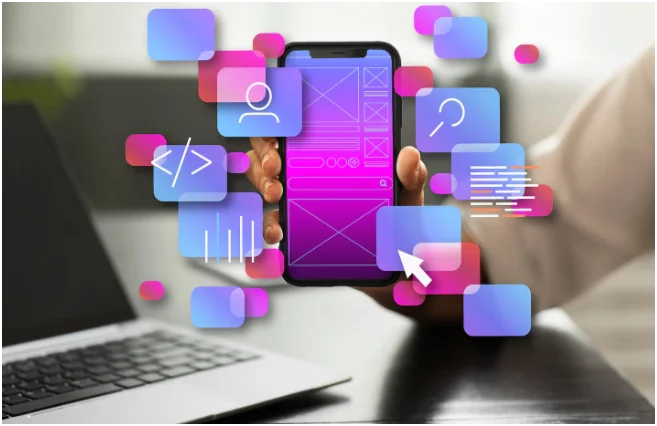In today’s fast-paced digital world, developing high-quality mobile apps that meet user expectations is more critical than ever. As businesses increasingly rely on mobile apps to engage with customers and drive success, the need for a flexible, efficient, and collaborative development process has never been more apparent. This is where Agile methodology comes into play. Agile has revolutionized the way mobile app development teams work, offering faster delivery, higher quality, and a more collaborative environment.
In particular, mobile app development in Chicago has seen a growing shift towards Agile practices, allowing companies to build innovative, user-friendly apps while responding to ever-changing market demands. In this blog, we’ll explore how Agile methodology enhances the app development process, its core principles, and how it benefits businesses looking to build successful mobile apps.
What is Agile Methodology?
Agile is a project management and product development methodology that emphasizes flexibility, iterative progress, and continuous improvement. Originally used in software development, Agile methodologies have expanded across many industries, including mobile app development. Unlike traditional methods, where a project is completed in large, inflexible phases, Agile divides the work into smaller, manageable chunks called “sprints.”
Each sprint involves a cycle of planning, development, testing, and review, with each phase contributing to the final product. The goal is to create a working product incrementally, allowing teams to adjust to changes quickly and incorporate feedback from stakeholders.
How Does Agile Work in Mobile App Development?
Agile works in short cycles, typically between one and four weeks, referred to as sprints. Each sprint results in a product increment that brings the project closer to completion. For mobile app development, this methodology is invaluable because it allows teams to continuously build, test, and refine features without waiting for the entire app to be completed before reviewing progress.
The Agile process is highly collaborative, with frequent communication between developers, project managers, clients, and stakeholders. With Agile, app developers work closely with clients to ensure the product aligns with business goals and user needs, while also ensuring transparency and ongoing feedback. The iterative nature of Agile allows app developers to make adjustments quickly and efficiently, ensuring the final product is of the highest quality.
Key Benefits of Agile in Mobile App Development
1. Faster Time-to-Market
One of the most significant advantages of Agile methodology is its ability to deliver a mobile app in less time compared to traditional development methods. In a typical waterfall model, development happens in large chunks, making it harder to see the progress and identify issues until the later stages. With Agile, teams focus on smaller increments, which allows for faster delivery of features and the overall product.
By breaking down the project into manageable sprints, Agile teams can deliver a minimum viable product (MVP) early in the process, allowing clients to test the product and gather feedback before full-scale development. This not only accelerates the development process but also allows businesses to get their app into the hands of users sooner.
2. Flexibility and Adaptability
The mobile app landscape is constantly evolving, with user expectations and market trends shifting regularly. Agile’s iterative nature allows developers to adapt quickly to these changes. If a new technology or feature emerges, or if user feedback reveals issues that need attention, Agile makes it easy to pivot without starting the entire project from scratch.
For businesses, this flexibility is invaluable. Instead of committing to a rigid, long-term plan, you can adjust the app’s direction based on real-world feedback. This allows you to stay ahead of competitors and ensure the app remains relevant in a rapidly changing market.
3. Improved Collaboration
Agile methodology encourages close collaboration between development teams and clients. The process is highly transparent, with regular meetings and updates to ensure all stakeholders are on the same page. Clients have the opportunity to provide input and feedback at the end of each sprint, helping developers better understand their needs and refine the app’s functionality accordingly.
For example, a MVP custom app development company may create a simple version of the app in the initial sprint, allowing the client to test the core features. After receiving feedback, the development team can make necessary adjustments in subsequent sprints. This level of communication and collaboration helps ensure that the app meets the business’s goals and provides the best user experience possible.
4. Continuous Improvement
In Agile, each sprint concludes with a review, followed by retrospective meetings where the team evaluates what went well and what could be improved. This focus on continuous improvement allows development teams to refine their processes and make incremental adjustments that enhance productivity and product quality over time.
For mobile app development, this is essential. With the fast pace of technological advancements and user expectations, Agile provides a framework for teams to continuously improve the app based on real-world usage and feedback. As a result, the app becomes more polished and refined with every sprint, leading to a higher-quality product by the time it is fully developed.
5. Better Risk Management
In traditional development models, risk is often identified late in the process, making it difficult to address issues without causing delays or significant rework. With Agile, risks are identified early and addressed incrementally throughout the development process. The constant feedback and testing cycles help identify issues before they become major roadblocks, reducing the chances of costly mistakes.
For example, in mobile app development, Agile allows teams to identify bugs and usability issues early, making it easier to address them before they escalate. This proactive approach to risk management ensures that the project stays on track and avoids delays or cost overruns.
How Agile Improves the MVP Development Process
One of the most significant ways Agile benefits mobile app development is through the creation of a Minimum Viable Product (MVP). An MVP is a simplified version of your app with only the core features needed to solve a problem or meet a specific need. The goal of an MVP is to test the app concept in the real world, gather user feedback, and validate assumptions before investing more resources into full-scale development.
Agile is the ideal methodology for MVP development because it allows teams to create a working version of the app quickly, test it with users, and refine it based on feedback. Each sprint produces an updated version of the MVP, which can be improved with each iteration.
For a MVP custom app development company, Agile provides a clear structure for delivering a functional, testable product in a short period. This allows businesses to validate their app ideas, reduce the risk of failure, and make informed decisions about which features to build next. By using Agile, companies can ensure that their app is not only functional but also well-received by users before committing to full-scale development.
Agile vs. Traditional Development Methods
In traditional software development models, such as Waterfall, the project is completed in a linear fashion. The scope, requirements, design, development, and testing phases are completed sequentially, with each step relying on the previous one. This approach can be rigid and time-consuming, with little room for changes once the process begins.
Agile, on the other hand, takes a more flexible and iterative approach. It emphasizes collaboration, rapid prototyping, and regular feedback, which allows the development process to be more adaptive and responsive to changes. The ability to incorporate user feedback early and often makes Agile particularly valuable in mobile app development, where user preferences and technological trends can shift rapidly.
How to Implement Agile in Your App Development Process
To implement Agile in your app development project, it’s important to work with a development company that has experience in Agile methodologies. Look for companies that use Agile practices such as Scrum or Kanban, which focus on iterative cycles, regular updates, and ongoing collaboration.
During the initial stages, the development team will work with you to define the project scope, identify key features, and break the project down into smaller, manageable sprints. Once the sprints are defined, the team will begin developing the app, continuously testing and improving the product based on user feedback.
Throughout the development process, you’ll be involved in regular sprint reviews, ensuring that the app aligns with your business goals and user needs. This level of collaboration is one of the key reasons Agile methodology leads to successful app development.
Conclusion
Agile methodology has transformed the way mobile app development teams approach the creation of mobile apps. By offering faster delivery, flexibility, improved collaboration, and better risk management, Agile enables teams to create high-quality apps that meet user expectations and drive business success. Whether you’re looking to develop a cutting-edge app or create an MVP to test your idea, Agile provides a framework that ensures your app is built to meet the demands of today’s fast-paced mobile market.
For businesses looking for MVP custom app development company, implementing Agile methodology can ensure the development process is streamlined, adaptive, and user-centered. By embracing Agile, you can improve your app’s chances of success and ensure it delivers lasting value to your users.
FAQs
1. What is Agile methodology in app development?
Agile methodology is a flexible, iterative approach to app development where work is divided into smaller, manageable parts called sprints. This allows developers to build, test, and improve the app continuously, incorporating feedback and making changes quickly.
2. Why is Agile important for mobile app development?
Agile ensures faster delivery, flexibility, and better collaboration between developers and clients. It allows developers to make adjustments throughout the process based on feedback, ensuring the app aligns with business goals and user needs.
3. How long does it take to build an app using Agile?
The development timeline can vary depending on the complexity of the app. However, with Agile, apps are developed in smaller sprints, which typically take one to four weeks. This allows for quicker iterations and faster delivery of key features.
4. What is an MVP in app development?
A Minimum Viable Product (MVP) is a basic version of an app with only essential features to meet user needs. It’s built quickly to gather feedback and validate the idea before investing more time and resources into full-scale development.
5. How do I choose the right app development company?
Look for a company with experience in Agile development, a strong portfolio, and a collaborative approach. Make sure they understand your business goals and offer flexibility in adapting the app based on user feedback and market changes.


